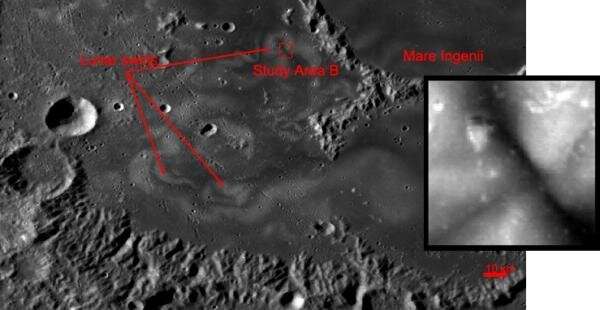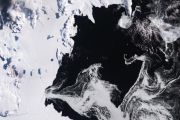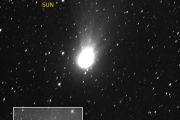
Copernical Team
A View Filled With Ventifacts - Sols 3417-3418
 Our Monday drive was successful, and we are now fully surrounded by the rocks that cap the Greenheugh pediment. From here we can see hundreds of ventifacts - a term that describes rocks which have been abraded by wind-blown sand into distinctive, flattened facets with crisp edges. This terrain is very different from what we've become used to seeing during our climb up Mt. Sharp!
Today's pl
Our Monday drive was successful, and we are now fully surrounded by the rocks that cap the Greenheugh pediment. From here we can see hundreds of ventifacts - a term that describes rocks which have been abraded by wind-blown sand into distinctive, flattened facets with crisp edges. This terrain is very different from what we've become used to seeing during our climb up Mt. Sharp!
Today's pl Poland signs with Virgin Orbit for domestic launch services
 In an official letter of intent with the leading responsive space company Virgin Orbit (Nasdaq: VORB), the Polish Space Agency (POLSA), the agency overseeing Poland's space development, conveyed its strong interest in bringing a domestic launch capability to Poland, a development uniquely made possible through Virgin Orbit's air-launched LauncherOne system.
The signed letter codifies the P
In an official letter of intent with the leading responsive space company Virgin Orbit (Nasdaq: VORB), the Polish Space Agency (POLSA), the agency overseeing Poland's space development, conveyed its strong interest in bringing a domestic launch capability to Poland, a development uniquely made possible through Virgin Orbit's air-launched LauncherOne system.
The signed letter codifies the P US comic Pete Davidson not going to space after all
 Plot twist: American comedian and actor Pete Davidson isn't going to space next week after all.
The 28-year-old star of Saturday Night Live, who has been in the news recently because of his relationship with Kim Kardashian, is "no longer able to join the NS-20 crew on this mission," Blue Origin said in an announcement late Thursday.
The space company owned by Amazon tycoon Jeff Bezos di
Plot twist: American comedian and actor Pete Davidson isn't going to space next week after all.
The 28-year-old star of Saturday Night Live, who has been in the news recently because of his relationship with Kim Kardashian, is "no longer able to join the NS-20 crew on this mission," Blue Origin said in an announcement late Thursday.
The space company owned by Amazon tycoon Jeff Bezos di Russian-European Mars mission suspended over Ukraine war
 A Russian-European mission to land a rover on Mars has been suspended due to the Kremlin's invasion of Ukraine, the European Space Agency announced Thursday, as Moscow said it regretted the "bitter" decision.
The ExoMars mission had been set to use a Russian launcher later this year to send a European rover to drill for signs of life on the Red Planet.
However, the ESA said the war in Uk
A Russian-European mission to land a rover on Mars has been suspended due to the Kremlin's invasion of Ukraine, the European Space Agency announced Thursday, as Moscow said it regretted the "bitter" decision.
The ExoMars mission had been set to use a Russian launcher later this year to send a European rover to drill for signs of life on the Red Planet.
However, the ESA said the war in Uk NASA rolls out its mega Moon rocket -- here's what you need to know
 NASA's massive new rocket is poised to make its first journey to a launchpad on Thursday ahead of a battery of tests that will clear it to blast off to the Moon this summer.
It will leave the Kennedy Space Center's Vehicle Assembly Building at 5:00 pm Eastern Time (2100 GMT) and begin its glacially slow, 11-hour crawl on a transporter to the hallowed Launch Complex 39B, four miles (6.5 kilom
NASA's massive new rocket is poised to make its first journey to a launchpad on Thursday ahead of a battery of tests that will clear it to blast off to the Moon this summer.
It will leave the Kennedy Space Center's Vehicle Assembly Building at 5:00 pm Eastern Time (2100 GMT) and begin its glacially slow, 11-hour crawl on a transporter to the hallowed Launch Complex 39B, four miles (6.5 kilom NASA rolls out its mega Moon rocket—here's what you need to know

NASA's massive new rocket is poised to make its first journey to a launchpad on Thursday ahead of a battery of tests that will clear it to blast off to the Moon this summer.
It will leave the Kennedy Space Center's Vehicle Assembly Building at 5:00 pm Eastern Time (2100 GMT) and begin its glacially slow, 11-hour crawl on a transporter to the hallowed Launch Complex 39B, four miles (6.5 kilometers) away.
Lunar swirl patterns and topography are related, study finds

Bright and dark swirling patterns on the Moon's surface have been linked to the topography of the swirls, says a new paper by a team of scientists from the Planetary Science Institute.
"This is the first time there has been a demonstrated correlation between the swirl albedo patterns and topography," said PSI Senior Scientist Deborah Domingue, lead author of "Topographic Correlations within Lunar Swirls in Mare Ingenii" that appears in Geophysical Research Letters.
ESA Council meeting - media information session
 Video:
01:01:27
Video:
01:01:27
Replay of the media information session following the 306th ESA Council, held on 16 and 17 March 2022 in Paris, France. Updates were provided on ESA’s main programmes, the outcome of the 16 February Space Summit in Toulouse, upcoming missions for Earth Observation, and for ESA astronauts, the overall rollout of the Director General’s Agenda 2025 on the way to the ESA Ministerial Meeting in November 2022 as well as the implications of the current geopolitical situation on ESA’s activities.
ExoMars suspended
Press Release N° 9–2022
As an intergovernmental organisation mandated to develop and implement space programmes in full respect with European values, we deeply deplore the human casualties and tragic consequences of the aggression towards Ukraine. While recognising the impact on scientific exploration of space, ESA is fully aligned with the sanctions imposed on Russia by its Member States.
Astranis Space Technologies first MicroGEO Satellite completes final testing
 Astranis Space Technologies Corp. has announced that the first MicroGEO satellite is ready for launch after successful completion of final testing.
Astranis has now completed all major tests necessary for its first MicroGEO spacecraft to be ready to ship to the launch site, including vibration and vibroacoustic tests, final solar array and antenna deployment tests, propulsion system tests, soft
Astranis Space Technologies Corp. has announced that the first MicroGEO satellite is ready for launch after successful completion of final testing.
Astranis has now completed all major tests necessary for its first MicroGEO spacecraft to be ready to ship to the launch site, including vibration and vibroacoustic tests, final solar array and antenna deployment tests, propulsion system tests, soft 































